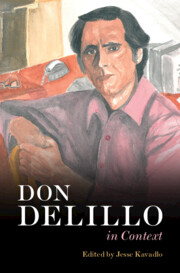Book contents
- Don DeLillo In Context
- Don DeLillo In Context
- Copyright page
- Contents
- Contributors
- Acknowledgments
- Abbreviations
- Introduction: Context, Content, Conflict
- Part I Places
- Part II History and Politics
- Chapter 5 The Cold War
- Chapter 6 The Kennedy Assassination
- Chapter 7 Terrorism
- Chapter 8 The Twenty-First Century
- Chapter 9 Prescience
- Part III Media and Pop Culture
- Part IV Literary Contexts
- Part V Material Contexts
- Part VI Social and Cultural Constructions
- Part VII Writing and Writers
- Further Reading
- Index
- References
Chapter 9 - Prescience
The Idea of the Future
from Part II - History and Politics
Published online by Cambridge University Press: 19 May 2022
- Don DeLillo In Context
- Don DeLillo In Context
- Copyright page
- Contents
- Contributors
- Acknowledgments
- Abbreviations
- Introduction: Context, Content, Conflict
- Part I Places
- Part II History and Politics
- Chapter 5 The Cold War
- Chapter 6 The Kennedy Assassination
- Chapter 7 Terrorism
- Chapter 8 The Twenty-First Century
- Chapter 9 Prescience
- Part III Media and Pop Culture
- Part IV Literary Contexts
- Part V Material Contexts
- Part VI Social and Cultural Constructions
- Part VII Writing and Writers
- Further Reading
- Index
- References
Summary
Don DeLillo’s fiction has long catalogued American fear and dread surrounding the future. While a select few texts, most memorably Underworld (1997) and Falling Man (2007), foreground a sense of narrative and cultural possibility, the future is often depicted as a lament. That sense of future vision is evident in his latest text – at the time of writing – Zero K (2016), which explores environmental decline and a shift from Underworld’s ideal of a democratic collective to a neoliberal embrace of necropolitics. Using both ecocriticism and a range of prior DeLillo scholarship, this chapter reads Zero K as a prescient warning of political upheaval and loss, and thus anticipates how hope and renewal can be located even in DeLillo’s late period writings.
Keywords
- Type
- Chapter
- Information
- Don DeLillo In Context , pp. 91 - 98Publisher: Cambridge University PressPrint publication year: 2022



